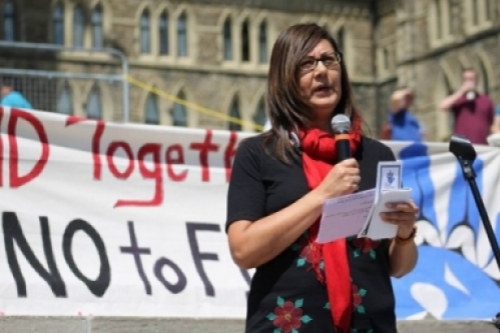You can change the colonial conversation. Chip in to rabble’s donation drive today!
The Harper government still hasn’t ratified an unpopular investment treaty it signed with China in September 2012. Legal experts wondered at the time if the deal, one of Canada’s several dozen Foreign Investment Protection Agreements (FIPAs), was unconstitutional. Several weeks later a small British Columbia community launched a court challenge to settle that very question.
According to journalists, the ongoing case — a direct challenge to the increasingly controversial investor-to-state dispute process in many Canadian and international trade deals — has stalled ratification of the Canada-China FIPA for over a year and could for another six months as an important legal appeal gets underway.
Background
The Hupacasath Nation of Vancouver Island argued in a court challenge that played out over nine months in 2012 and 2013 that the federal government failed to consult First Nations before signing the treaty as required by law. Furthermore, they said the investment treaty would potentially override Indigenous treaty rights and otherwise tilt the balance of power in questions of resource management from affected communities to expectant corporations.
The community has said from the beginning they decided to challenge this investment treaty for all Canadians, since arguably only a provincial government or First Nation has the right to do so and none of the provinces were stepping up.
In August 2013, a federal judge sided with the Government of Canada against the Hupacasath Nation, claiming that their case against the FIPA was too speculative. This was despite a wealth of Canadian and international evidence that investment tribunals are having an impact on governance by deciding important public policy questions outside of national courts or the reach of national constitutions.
For example, energy and mining companies use these treaties frequently to pressure governments into letting unpopular projects move forward or extorting financial penalties when they don’t. The federal justice conspicuously refused to hear from legal experts backing the Hupacasath case on grounds that their critical views on investment arbitration made them biased. The justice had no qualms accepting the views of government witnesses who profit from the system as arbitrators in these cases.
Two dozen organizations, including The Council of Canadians, rejected the federal court decision, vowed to support Hupacasath in whatever next steps they planned, and asked the federal government to refrain from ratifying the FIPA until those steps had been decided.
Appeal moves ahead
Hupacasath lawyers prepared an appeal and according to Brenda Sayers, who handles the FIPA challenge on behalf of Chief and Council, the case is moving forward again. Hupacasath lawyers have filed papers with the court of appeal and the federal government has until March 7 to do the same. After that, both sides have until March 17 to respond to each other’s positions. Brenda expects a decision in the appeal by early June.
In the coming weeks, we’ll talk about how you can support Hupacasath and their ongoing court challenge to the Canada-China FIPA. The community is about $50,000 short of the money they need to take this important case to the end. You can still donate to our Fundrazr page here.
It’s just as important to show visible support for Hupacasath and visible opposition to the FIPA and other corporate rights deals like it. Letters to the editor and to your local member of Parliament help keep the pressure on. If you live in B.C., consider inviting Brenda to your community to speak about the FIPA and the Hupacasath legal challenge. This could be done through one of The Council of Canadians’ local chapters in the province.
For more information about the FIPA with China, see our campaign page here.
Like this article? Chip in to keep stories like these coming!




